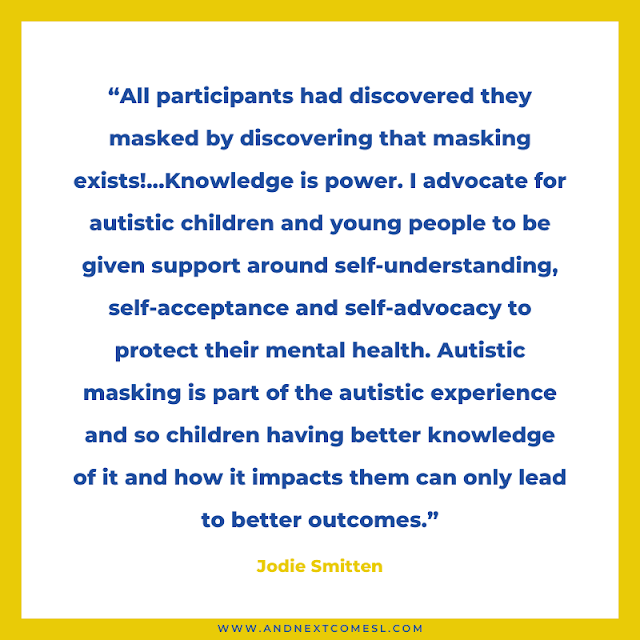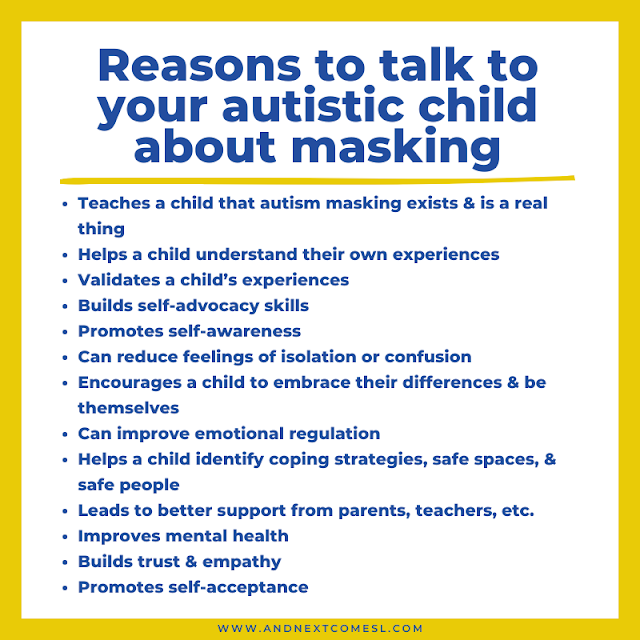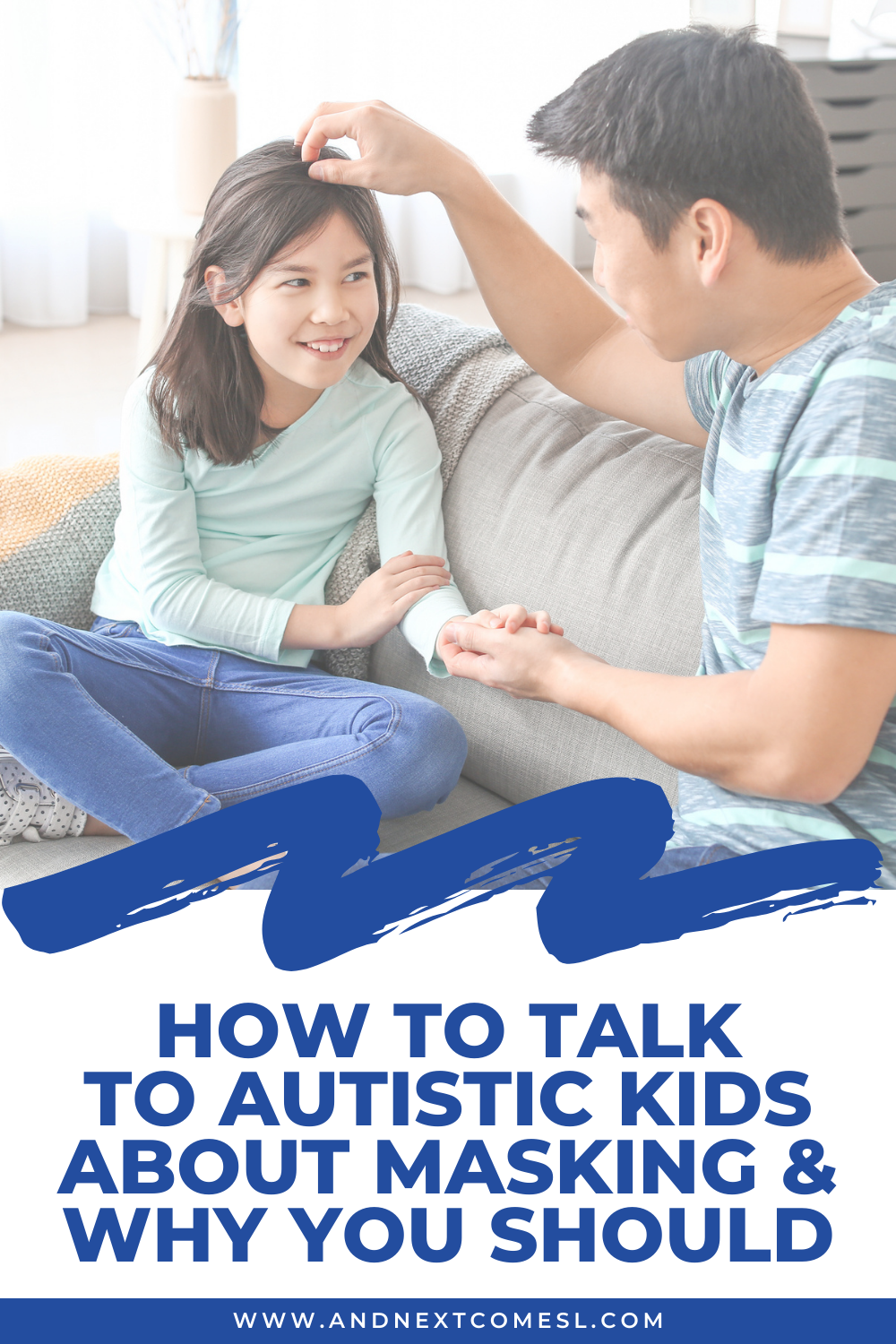It's so important to help autistic kids learn about their own autistic identity. Especially if you want them to be strong self-advocates as they grow, which I think we can agree is definitely something that we want.
Building a strong identity for your autistic child starts with telling them that they're autistic.
You can also talk to them about other autistic traits such as stimming and samefoods. Or special interests and infodumping. You can talk about autistic joy, celebrate differences, and highlight their strengths.
But one topic that probably doesn't get discussed enough is autism masking in children, despite it having a profound impact on mental health, among other things. After all, masking is something that a lot of autistic learners will engage in, even if they're not aware of it. Especially at school.
So, below we're going to discuss how to talk to autistic kids about masking and why you should. There are lots of benefits, as you'll see.
You'll also learn a variety of tips and strategies to start the conversation and even get a book recommendation. So let's dive in!
Reasons to Talk to Autistic Kids About Autistic Masking
Before we dive into some specific reasons, I'd like this section off by sharing a passage from "Masking in Autistic Children: The Child's Voice" by Jodie Smitten. In this paper, Jodie writes:
"All participants had discovered they masked by discovering that masking exists!...Knowledge is power. I advocate for autistic children and young people to be given support around self-understanding, self-acceptance and self-advocacy to protect their mental health. Autistic masking is part of the autistic experience and so children having better knowledge of it and how it impacts them can only lead to better outcomes."
This quote highlights just how empowering learning about autism masking can be for autistic children.
But, if that quote isn't reason enough, there are plenty of other benefits to talking to autistic kids about masking. For instance, it:
- Teaches a child that autism masking exists and is a real thing
- Helps a child understand their own experiences and gives them the language to communicate those experiences
- Validates a child's experiences
- Builds self-advocacy skills
- Promotes self-awareness
- Can reduce feelings of isolation or confusion (i.e., they know that masking is a common experience among autistic individuals)
- Encourages a child to embrace their differences and be themselves
- Can improve emotional regulation
- Helps a child identify coping strategies, safe spaces, and safe people
- Leads to better support from parents, teachers, etc.
- Improves mental health
- Builds trust and empathy (i.e., others can better understand the child's experiences and parents show they're willing to talk about important autistic traits)
- Promotes self-acceptance
As you can see, there are lots of benefits to talking to kids about autism masking. But how do you start the conversation? What do you talk about? What should you focus on? Well, that's what we'll cover next.
How to Talk to Autistic Kids About Masking
Like a lot of discussions about autistic identity and traits, this conversation about masking will be an ongoing one. It is something you will talk about more than once, especially as the child grows, their needs change, the social demands change, and so on.
So here are some tips for talking to your autistic child about masking behaviors:
- Define what autism masking is by using language and descriptions that are appropriate for the child's age, developmental level, and level of understanding - Keep things simple, use concrete and observable examples of masking behaviors, use analogies to make the concept more understandable, etc.
- Describe what autism masking looks like and what signs your child can look out for
- Observe and document the ways in which your child might be masking and make a list of situations where they might mask and any signs of masking in children you notice.
- Discuss some of the reasons why they might mask and why it might be helpful from time to time
- Talk about what makes your child feel safe and comfortable - Doing so will give you an idea of when, where, or with whom they feel safe enough to unmask
- Discuss some of the ways that a child might be inadvertently taught to mask their autistic traits (e.g., someone tries to stop them from stimming or forces them to make eye contact)
- Talk about when they might mask and when they might not (e.g., at school vs. at home)
- Discuss related topics such as sensory overload and autistic burnout, which can result from ignoring and masking sensory needs
- Write a social story about autism masking - You can use this free social story template to help
- Read books with your child that discuss autism masking - The book Speak Up! by Rebecca Burgess is an excellent choice.
- Discuss some of the long-term effects and consequences of autistic masking so that they are aware of them - You might want to keep them more general or only highlight what might be most relevant, depending on their age.
- Have ongoing conversations about identity, their support needs, advocating for those needs, etc. and be sure to highlight their strengths and celebrate differences while doing so
- Help kids understand their energy levels (try this free self care battery printable) and how to manage or balance those energy levels
- Discuss when masking might be needed for safety reasons
- Encourage questions and create an open and judgement-free space for talking about things like masking and autistic identity
- Talk about emotions and well-being
- Ask your child to share about their own experiences in different social situations - They might be able to touch on some of the internal struggles they are facing that aren't otherwise observable.
Remember, you will have to revisit this conversation and topic on a regular basis. So, it's important that you keep communication open and check in frequently with your child. Be available to answer any questions they may have and always keep learning more about autism masking.
Summary of Talking to Kids About Autism Masking
If you want your autistic child to live authentically and be a strong advocate for their needs, then you need to talk to them about important elements of autistic culture, such as autistic masking.
As you've been shown, there are plenty of benefits to talking to your child about this particular social survival strategy. Even just knowing that masking exists is extremely powerful!
There are lots of ways to have conversations about masking with your autistic child. You can read books, talk about identity and energy levels, discuss what the signs and reasons for masking are, and help your child identify situations in which they mask.
Remember that these conversations will be ongoing. They're not a one-and-done type of conversation. And hopefully these tips for how to talk to autistic kids about masking will come in handy as you continue to have these conversations going forward.









